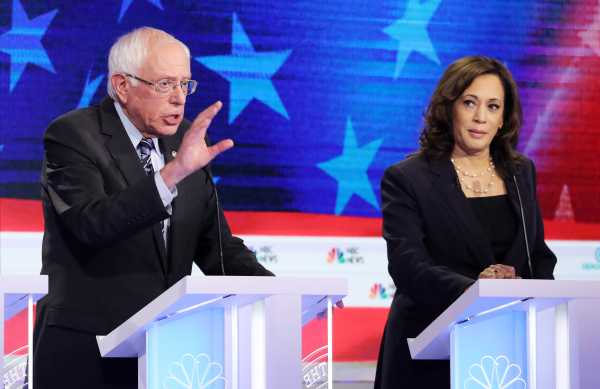
Progressive political Twitter is abuzz on the issue of Medicare-for-all ahead of the second Democratic debate this week, with the latest back-and-forth spurred by Kamala Harris’s recently released health care plan. Harris on Monday unveiled what, exactly, she calls Medicare-for-all, leading disagreement with Bernie Sanders to finally boil over.
Harris had signed onto Sanders’s Medicare-for-all single-payer plan in the Senate when he reintroduced the bill to much fanfare in 2017, but a new proposal she is also calling Medicare-for-all looks very different. This plan, and these distinctions, are now garnering major pushback from Sanders’s high-level campaign staff. They argue that it’s a circuitous route to universal coverage designed to please industry, while not answering voters’ actual demands.
“Call it anything you want, but you can’t call this plan Medicare for All,” Sanders’s campaign manager, Faiz Shakir, said in a statement. “Folding to the interests of the health insurance industry is both bad policy and bad politics.”
The differences between Harris’s plan and Sanders’s plan come down to two main factors. First, it’s phased-in over 10 years, versus Sanders’s four. And Harris’s would allow private insurers to compete within the government-run program, similar to the way that Medicare Advantage currently works for older adults’ plans. Sanders’s plan effectively eliminates private insurance.
Sanders staffers, including Shakir and speechwriter David Sirota, quickly levied their critiques on Monday, highlighting the downsides of keeping private insurers in the health care system. Among the biggest critiques that Medicare Advantage has received, for example, is its alleged abuse of billing practices. According to an NPR story, private insurers have overcharged Medicare by $30 billion in the past three years alone.
Harris’s plan is being flanked by criticism from the center as well; former Vice President Joe Biden’s campaign called Harris’s proposal “a Bernie Sanders-lite Medicare for All and a refusal to be straight with the American middle class, who would have a large tax increase forced on them with this plan.” (Biden put forth a plan for a public option that would be open to all Americans.)
But supporters of Harris’s plan argue that her version is a more practical means of getting to universal coverage that preserves a degree of choice that people like.
“Sen. Harris’s plan balances idealism and pragmatism,” says former Obama Centers for Medicare and Medicaid Services administrator Andy Slavitt. “It says in effect: We have a mandate to get everyone affordable health care and put people over profits — but we don’t need to tear down the things people have and they like in order to do it.”
“It’s very simple. There’s an option for choice,” says Brookings fellow and former Obama administration health care adviser Kavita Patel.
Ultimately, the difference between the two campaigns isn’t just about this particular policy. It’s also about the kind of change for which they’re willing to advocate. Sanders’s team is questioning Harris’s commitment to Medicare-for-all, her bona fides with the left, and her willingness to prioritize industry criticism.
Harris, meanwhile, has attempted to frame herself both as a progressive dedicated to pursuing ambitious plans and someone uninterested in major disruption. “I’m not trying to upend markets, I’m not trying to, you know, overhaul entire systems,” Harris said in an interview on New Hampshire radio, when asked to compare herself to Sanders and Warren.
Sanders has been clear that he has no problem with disruption. “The current system is already disrupting and destabilizing millions of people’s lives,” Sanders said in his major campaign speech about Medicare-for-all earlier this month.
The role of private insurers in the future of health care is a sticking point among Democrats
Under Sanders’s Medicare-for-all plan, there is a very narrow role for private insurance, which would only be used to cover supplemental procedures, like cosmetic surgery (something that currently doesn’t really exist). Harris’s plan, meanwhile, would still enable private insurers to compete and offer coverage, and is fundamentally not a single-payer system.
This distinction is a central dispute. While Harris’s backers say her plan is potentially more politically feasible (which, seeing as private insurance companies have come out in full force against policies that would even just lower the eligibility age for Medicare to 50, this argument should be taken with a grain of salt), Sanders’s backers argue that his approach would be far more effective in driving down health care costs, by eliminating the sway of private insurance companies once and for all. It’s worth noting as well that the industry has done little to help save the Affordable Care Act, another proposal that was seen as friendlier to business interests.
“I think this plan, similar to Medicare Extra, similar to Medicare for America are laudable in that they are aiming to achieve universalism,” says Adam Gaffney, a single-payer advocate and president of Physicians for a National Health Program. “But they’re trying to do it at the same time as accommodating the corporate interests of the corporate health care industry.”
Harris’s plan appears to respond to certain concerns that people have expressed about maintaining private insurance within the system, in addition to industry pushback.
But that’s precisely what the Sanders camp argues is unserious about the proposal: A 10-year phase in is more than a two-term presidency, opening it to more political vulnerability, and it’s not even preserving the employer-based health insurance that voters seem nervous about losing. (Harris’s camp says employers could get their plans “certified” as private plans in Medicare, theoretically allowing some people to keep the plans they like.)
“Eliminating the waste, greed, and profit motive of insurance and pharma corporations isn’t just the moral thing to do, it’s the best public policy and will save lives,” Josh Orton, Sanders’s policy director told Vox. “Despite paying twice as much as peer countries on per capital health care, but our health outcomes are often much worse.”
This all goes back to the fundamental divide between Sanders’s team and the more incremental proposals that other candidates have put out: one that questions whether any health care system that incentivizes care can operate on private profits.
Harris argues that she and Sanders have the same goal. Experts say keeping private insurers in the system complicates it.
Harris, in her plan, emphasizes that she and Sanders are focused on the same goal: guaranteeing insurance coverage for every American. Keeping private insurers in the system to the degree that she does can have some serious drawbacks, however.
For one, it means navigating the profit-centered business models of private insurers, who are less interested in driving costs down. While Harris’s plans claims there will be hefty regulations on private insurers, those who are skeptical note that the government has previously struggled in trying to curb the industry’s abuses, including over-billing under Medicare Advantage.
“It will be harder to achieve the goal of lower spending if private insurers retain a central role because they will also want to maintain a profit,” University of Pennsylvania health law professor Allison Hoffman told Vox.
“You can rein in abuses, but new ones always seem to crop up,” single-payer advocate Gaffney added.
The inclusion of private insurers in the plan could make it potentially more likely to come to fruition, though it poses a significant compromise for those who have long fought for Medicare-for-all and is still likely to come up against major industry pushback. As Gaffney notes, any major Democratic health care reform will require a significant political fight. Offering concessions to private insurers — who have much higher administrative costs than Medicare — could ultimately sacrifice the gains this policy transformation is seeking.
“If you sacrifice the efficiencies of single-payer, I’m not sure we can afford to deliver the benefits of single-payer,” he said.
Sourse: vox.com






